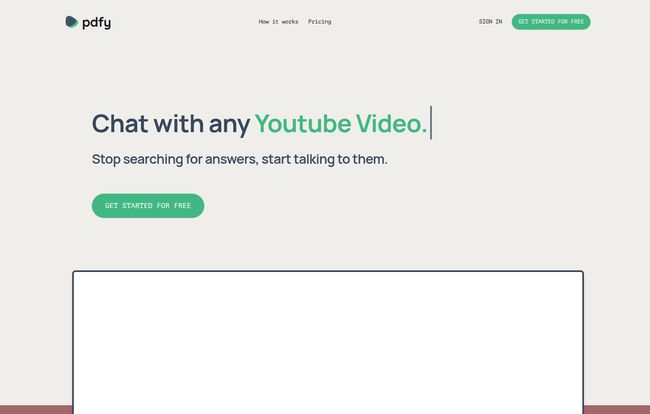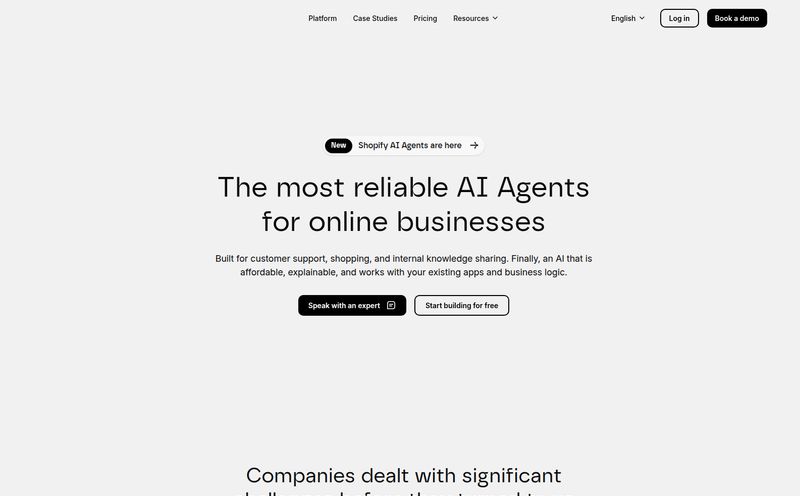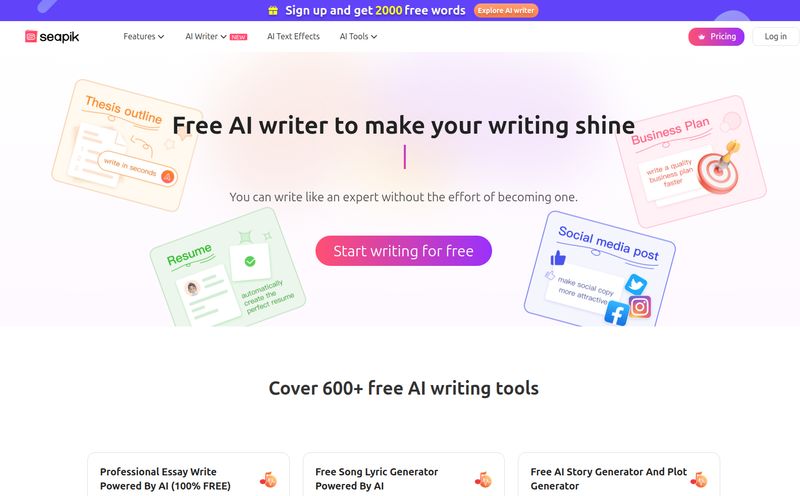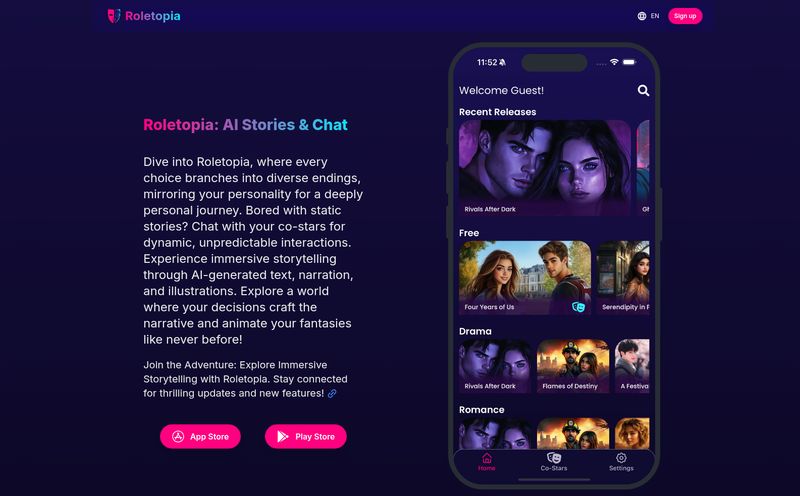If your digital life is anything like mine, it’s a chaotic mess of PDFs, browser tabs, saved YouTube videos, and random audio files. It’s a digital paper trail that stretches back for years. I’m an SEO guy, so I’m constantly swimming in data—keyword research reports, competitor analysis PDFs that are 80 pages long, dense marketing podcasts, and hour-long conference talks on YouTube. Finding that one specific stat or quote feels like trying to find a specific piece of hay in a giant, global haystack.
For ages, the process has been the same: CTRL+F, frantic scrolling, re-listening to audio at 2x speed, and generally losing the will to live. So when a tool comes along that says, “Stop searching for answers, start talking to them,” my ears perk up. That’s the promise of PDFy.ai, and I have to admit, I was skeptical. Another AI tool promising to solve all my problems? Sure. But this one felt a little different. So I took it for a spin.
So, What is PDFy.ai, Really?
On the surface, it looks like another “ChatPDF” app. You’ve probably seen them around. You upload a PDF, and you can ask it questions. Cool, but not exactly groundbreaking anymore. But that’s where PDFy.ai pulls a little trick from its sleeve. The name is almost a misnomer, because it’s not just about PDFs.
Think of it less as a PDF reader and more as a personal data assistant. You can feed it:
- PDFs: The obvious one. Think research papers, e-books, financial reports.
- Websites: Just drop a URL and start interrogating it. Amazing for analysing competitor landing pages or summarizing long-form articles.
- Audio Files: Got a recording of a two-hour meeting? Upload it and ask for the action items. Yes, really.
- YouTube Videos: This one got me excited. You can drop a YouTube link and ask questions about the video’s content without watching the whole thing.
It essentially turns static information into a conversational partner. It’s like having a hyper-intelligent intern who has read, watched, and listened to everything you’ve given them and is ready to be quizzed. And they dont need coffee breaks.
Who Is This Actually For?
I can see a few groups of people getting a massive productivity boost from this.
The Overwhelmed Student or Researcher
Imagine having to digest a dozen academic papers for a literature review. Instead of painstakingly reading every single one, you could upload them to PDFy.ai and ask, “What are the main arguments against this theory across these documents?” or “Summarize the methodology of this study in three sentences.” It’s not about cheating the system; it’s about working smarter. You can find the core information fast and then decide which papers need a deeper, more manual read. The ability to professionally quote sources, as the site mentions, is a huge plus here.
The Time-Strapped Professional (Like Me!)
In the corporate or marketing world, this is a godsend. I recently used it on a competitor’s incredibly long whitepaper about 2024 SEO trends. I just asked it, “What are their top 5 predictions for link building?” and got a concise answer in seconds. I could then follow up with, “Expand on prediction number 3.” This turned 45 minutes of skimming into a 5-minute conversation. It’s also brilliant for getting the gist of a client's website or a long email thread you've been avoiding.
Anyone with a Curiosity
Ever see a long YouTube documentary and just want to know if they mention a specific topic before you invest two hours? Drop the link in PDFy.ai. It makes information more accessible, and I’m all for that.

Visit pdfy.ai
The Standout Features I Actually Liked
It’s Not Just for PDFs (Did I Mention That?)
I know I'm repeating myself, but this multi-source capability is the absolute killer feature. The AI market is flooded with single-purpose tools. A tool that can handle text, audio, and video in one place is just... efficient. It simplifies my workflow, and that's the whole point of productivity software, isn't it?
The OCR Support is a Quiet Hero
Ever scanned a document and saved it as a PDF? You know how you can’t select the text? That’s because it’s just an image. OCR, or Optical Character Recognition, is the technology that scans that image and turns it into actual, readable text that a computer can understand. PDFy.ai has this built in. This means you can take that old scanned textbook or a picture of a document and it will still be able to read and analyze it. A lot of other tools charge extra for this or don’t have it at all. Huge win.
Let's Talk About the Price Tag
Alright, the all-important question: how much does it cost? The pricing structure is refreshingly straightforward. No hidden fees or confusing credit systems.
| Plan | Price | Key Limits |
|---|---|---|
| Free | €0.00 / month | 5 sources / month, 50 questions / month |
| Premium | €8.99 / month | 25 sources / month, 500 questions / month |
| Ultimate | €12.99 / month | 100 sources / month, 5,000 questions / month |
In my opinion, the Free plan is genuinely useful for casual use. 5 sources a month is enough to test it out and handle the occasional long document. The Premium plan feels like the sweet spot for most professionals or students who will be using this regularly. For €9, you get a pretty significant jump in capacity. The Ultimate plan is clearly for power users—people who are probably integrating this into their daily workflow for research or content creation on a massive scale.
One thing to note is that all plans, including paid ones, have a max file size of 50MB. That's pretty generous for most documents but could be a constraint for super high-res video or audio files. Something to keep in mind.
The Not-So-Perfect Bits
No tool is perfect, and it’s important to be honest about the trade-offs. The limits on the Free and Premium plans are just that—limits. If you're a heavy researcher, you might burn through your 25 sources on the Premium plan faster than you think. You have to be a bit strategic about what you upload.
Also, customer support on the paid plans is listed as 'Email'. That's fine for most queries, but if you're in a real jam and need instant help, you won’t be getting a live chat or phone call. For the price, it’s understandable, but it's a limitation nonetheless. A minor quible, perhaps, but one to be aware of.
Is PDFy.ai Worth Your Time?
So, the final verdict. I went in skeptical and came out pleasantly surprised. PDFy.ai isn’t just another drop in the AI ocean. Its ability to conversationally query multiple source types—especially video and audio—sets it apart from the massive crowd of simple ChatPDF tools.
It’s not going to write your research paper for you, nor should it. But it will absolutely be your most valuable research assistant. It cuts down the noise and helps you get to the signal faster. For me, that’s a massive win. It’s a tool designed to give you back your most valuable asset: time. And it actually delivers on that promise. I'd say give the free plan a shot; you’ve got nothing to lose and a whole lot of productivity to gain.
Frequently Asked Questions
Is PDFy.ai free to use?
Yes, there is a “Free forever” plan that gives you 5 sources and 50 questions per month. It's a great way to try out all the core features before deciding if you need a paid plan.
What types of files can I use with PDFy.ai?
You can use a wide range of sources, including PDFs, websites (by providing a URL), audio files, and YouTube videos. This multi-source capability is one of its biggest strengths.
What is OCR and why does it matter?
OCR stands for Optical Character Recognition. It's a technology that allows the AI to read text from images, such as scanned documents or photos of a page. PDFy.ai includes OCR support, which means you can get insights even from non-selectable text in your PDFs.
Is there a limit to the size of files I can upload?
Yes, for all plans (including the paid ones), there is a maximum file size limit of 50MB per source. This is generally sufficient for most documents and standard audio files but could be a limitation for very large, high-resolution media.
Who is the ideal user for PDFy.ai?
It’s ideal for students, researchers, marketers, analysts, and any professional who needs to quickly extract information from dense documents, websites, or media files without spending hours manually reviewing them.
Is my data kept private?
Like with any cloud-based AI tool, it's smart to be mindful of what you upload. Always check the platform's latest privacy policy. For general research and public documents it's fantastic, but I'd be cautious about uploading highly sensitive or proprietary information, which is a good rule of thumb for most online tools.
Reference and Sources
- PDFy.ai Official Website: https://www.pdfy.ai
- PDFy.ai Pricing Information: https://www.pdfy.ai/pricing



